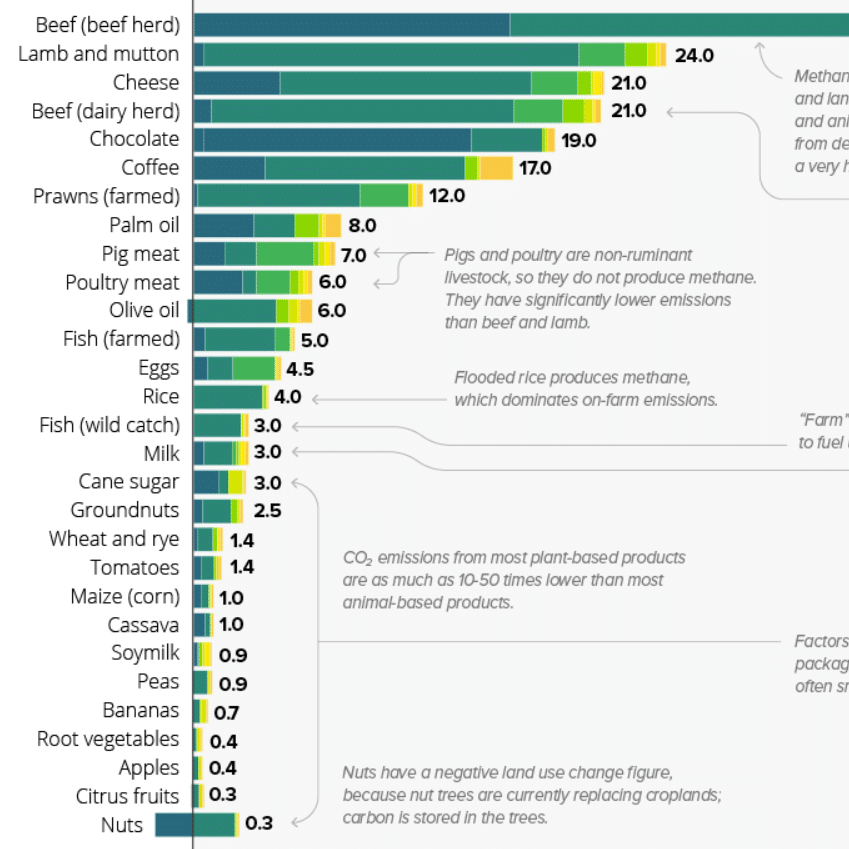Overview
““When we eat, we are taking the world into our bodies; that’s a very profound thing. We are changed by what we eat and we in turn change what we are eating. Our most profound engagement with the natural world happens on our plates.” – Michael Pollan, American author, journalist, activist and professor
Our values are served up on our plates each and every time we eat. The foods we choose and avoid express what’s important to us. So how can we eat in a way that respects the planet? A plant-based or vegan diet is a great way to live in harmony with people, all species, and our Earth. It is not restrictive (in terms of eliminating meat, poultry, fish, eggs, dairy and other animal products), but rather a celebration of the abundance of plants rich in nutrients, variety, flavor and life!
Meat-free diets are not new; they have been central to many traditions over thousands of years! Buddhists, Hindus, Rastafarians, and Quakers advocate vegetarianism as an extension of their belief in practicing non-violence. Vegetarianism is the practice of not eating meat but still may eat animal byproducts (e.g., dairy and egg products) while veganism does not practice the consumption of any products that come from animals. Vegetarianism and veganism can be traced back to deep roots in cultures in Africa, India, and the Mediterranean basin.While certain cultures do include meats in ritual events, medicine or other traditional societal components, like Native Alaskan peoples, such sustainable methods of local hunting, fishing and gathering that revere the animals and environment are not the norm for meat-eating diets.
Conventional animal agriculture is one of the main contributors to environmental degradation, accelerated climate change, and negative impact on natural resources.
The facts speak for themselves:
Greenhouse gas emissions. Food production is responsible for 35% of all global greenhouse gas emissions, and 57% of food production emissions is from animal agriculture, meaning that animal agriculture is responsible for 19.95% of global emissions. Animal agriculture releases massive amounts of carbon and is responsible for 44% of global methane production.
Biodiversity Loss. We are perilously trading rich biodiversity for agricultural land to grow feed crops and provide grazing for animals. Animal agriculture is responsible for nearly 33% of biodiversity loss and 70% of deforestation in the Amazon rainforest.
Ocean destruction. Through pesticide, fertilizer and waste runoff, livestock has indirectly caused more than 500 nitrogen-flooded dead zones in the ocean. The exploitative practices of the seafood industry have caused dangerous overfishing in 34.2% of fisheries, and the number is growing. By continuing current fishing practices, the oceans may be fishless by 2048, but ocean fish might still be able to recover if unsustainable fishing practices change now.
Inefficient Land Use. Animal agriculture perpetuates the global hunger crisis because it is a highly inefficient use of resources and produces far less food than plant-based agriculture. Almost 80% of agricultural land is attributed to animal agriculture, In addition, one pound of beef requires about 1,847 gallons of water, whereas only 39 gallons of water is needed to produce a pound of vegetables.
Carbon Footprint: Animal products have a much larger impact on the environment and carbon cycle than plant-based products. For example, the greenhouse gas levels emitted to produce 1 kg of beef are 99.48 kg of CO2. In comparison, wheat and rye produce only 1.57 kg of CO2 emissions per 1kg of food, and root vegetables produce 0.53 kg of CO2 per 1 kg of food. This includes land use change (such as deforestation), production, packaging, transportation, retail, etc. In fact, most animal products have CO2 emissions that are 10 to 50 times higher than plant-based products!
Pollution. As animal agriculture was industrialized on a large scale, factory farms fundamentally altered the way animals are raised and turned into food. Livestock food is high in synthetic pesticides and chemicals, so manure cannot be returned to nature as fertilizer. As a result, animals within each Concentrated Animal Feeding Operation (CAFO) generate tons of toxic manure that leach heavy metals and nitrates into soil and groundwater. This is called a nonpoint source pollution, where pollution comes from many sources and cannot be easily traced, making it more difficult to fight. Nutrient pollution from manure can cause algal blooms in water and fatal health issues in humans, among other dangerous consequences.
Disease. Factory farms, especially in the United States, use a large amount of growth hormones. The combination of rapid growth, unsanitary living conditions, and overcrowding results in high rates of disease, which has led to rampant use of antibiotics in animal feed. This sharply increases antibiotic-resistant bacteria and causes over 2 million illnesses and an estimated 23,000 deaths per year.
The good news is that the numerous benefits of plant-based diets are becoming more widely known, gaining both favor and accessibility!
Scientific research highlighted in The China Study shows that a plant-based diet can reduce risk of type 2 diabetes, heart disease, various types of cancer, and other major illnesses. Many people also report bigger fitness payoffs, more energy, reduced inflammation, clearer skin, and wide-ranging better health outcomes after making the switch.
California legislators recently approved a bill to fund a school lunch program with plant-based food for millions of children. Alternatives to animal products are exploding in popularity and plant-based dishes are now found on countless menus, with more and more plant-based restaurants opening in nearly every city. Traditionally meat-heavy chains such as Burger King and Shake Shack are offering ever-expanding meatless menu options. It’s a movement rightfully gaining momentum every day!
So who is part of the plant-based movement? You might associate plant-based or vegan diets with one type of person or lifestyle, but these are fundamentally intersectional movements. Black activists are doing incredible work today, such as Tabitha Brown, Aph Ko of Black Vegans Rock, Syl Ko, Dr. Amie “Breeze” Harper, and many more. Veggie Mijas is a national collective of nonbinary folks and femmes of color that strives to connect and spotlight plant-based people of color. Look around your community or check out Instagram accounts like byanygreens, davinadavegan, vegicano, theminimalistvegan, vegan richa, eatthisorg, queerbrownvegan, peacebyvegan and many more to see the breadth of vegan foodies, plant-based enthusiasts, and food and animal rights activists around the globe.
Changing your diet to include more plant-based foods doesn’t have to happen all at once. A great way to begin the transition is through Meatless Monday. Eating plant-based just ONE day a week can save 1,150 gallons of water, 32 square feet of forest, and 21 pounds of carbon dioxide! You can always go a step further and think about ways to include plant-based food the rest of the week. There are many ways to explore a plant-based diet, so find one that works for you! From eating vegan meals once, twice or seven times a week, to changing the ratio of animal products to veggies on your plate, to cutting certain meats, poultry, eggs and dairy from your diet entirely, every approach makes a difference.
Check out recipes from our partners at Meatless Monday Campaigns and these taco and loaded nachos recipes from RW Garcia for inspiration, as well as great plant-based snacks to power us through PGC and beyond! RW Garcia offers a delicious array that are all plant-based, non-GMO and gluten-free. Our Conscious Kitchen Cookbook also has a wealth of plant-based FLOSN recipes!
THINK
There are many misconceptions about eating a plant-based or vegan diet. One is that you can’t get enough nutrients, which is absolutely incorrect. Plants are not only nutrient-dense, but also far more interesting, varied and flavor-packed than many other foods.
ACTION
Read this article on how different cultures around the world follow plant-based diets. Then read this article on 12 reasons to go plant-based.
- Select the two reasons you find compelling and share with us.
- Why is adding more plants to your diet intriguing?
THINK
Plant-based eating is rapidly growing in popularity — and for good reason! 31% of Americans now practice meat-free days. Vegan food is flourishing around the world, and chefs, restaurants, businesses and grocers are rising to meet consumer demand by creating and providing more and ever-improving plant-based options.
ACTION
Read “How to Make Anything Vegan,” check out this article on vegan-friendly cuisine globally, and look into other cultures with plant-based food.
- Think about what you eat in a typical day. Do some research to find out how you would make a breakfast, lunch and dinner 100% plant-based.
- Curate a one-day menu with recipes for plant-based versions of each meal. If you are already plant-based, create a menu for a friend or family member who regularly consumes animal products.
THINK
Reducing consumption of animal products for even one day can have a substantial positive impact on your health and the environment. You have the power to start making change right now!
ACTION
Any and every day can be plant-based, so let’s make it today! Invite a family member, friend or roommate to join you in eating plant-based for the day, whether you are together or apart. Make sure at least one of you typically consumes animal products. Dream up and browse menu ideas rich in fruits, vegetables, nuts, grains, seeds, legumes, and plant proteins. There’s a ton of room for creativity and experimentation!
Struggling with ideas? For super simple and inexpensive recipes, check out these popular plant-based bloggers and YouTubers: Mina Rome, Pick Up Limes, Rachel Ama, and SweetPotatoSoul or search a relevant hashtag like #vegan, #plantbased, #plantbaseddiet, #veganfood and more. Meatless Monday has additional recipes for inspiration! You can also check out Veggie Mijas’ recipe blog for recipe inspiration.
Record everything you and your friend/roommate/family member eat for the day, take at least two photos, and both answer the following:
- Was it easier or harder than you thought to go without animal products for the day?
- How do you feel after three plant-based meals?
- Do you think you will continue to eat more plant-based meals, make one day a week exclusively plant-based, or even consider adopting a plant-based, vegetarian or vegan diet?


